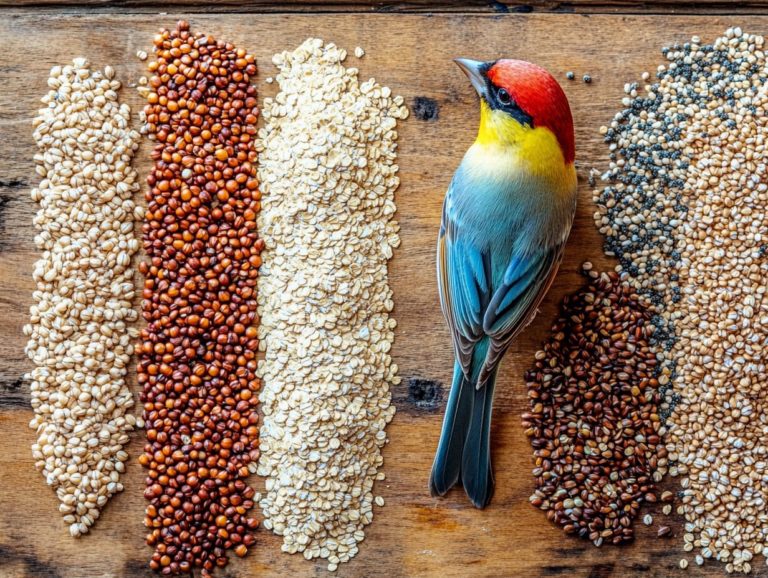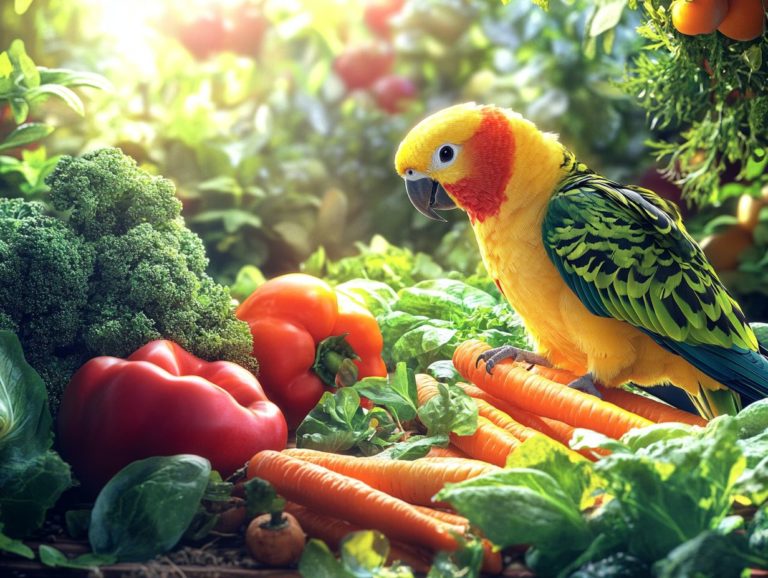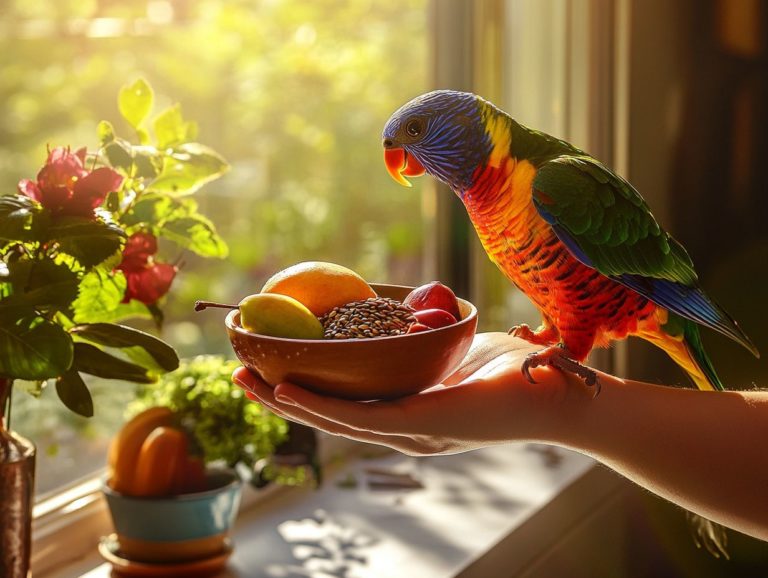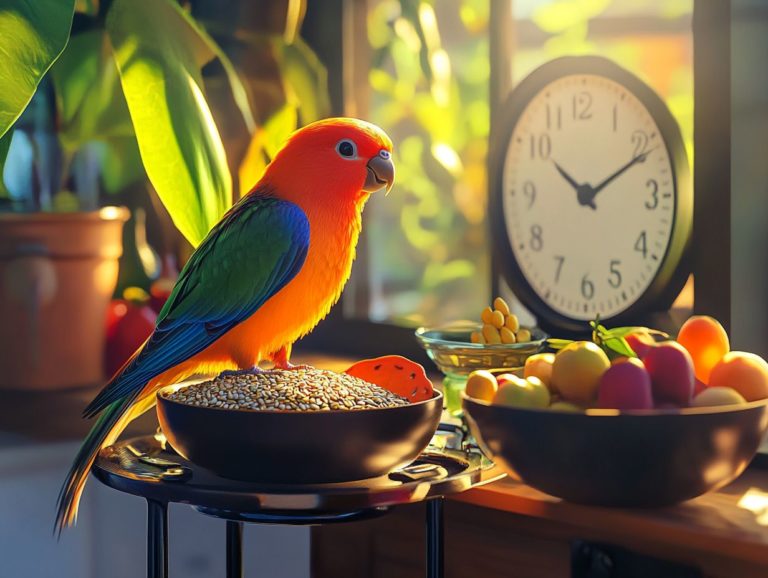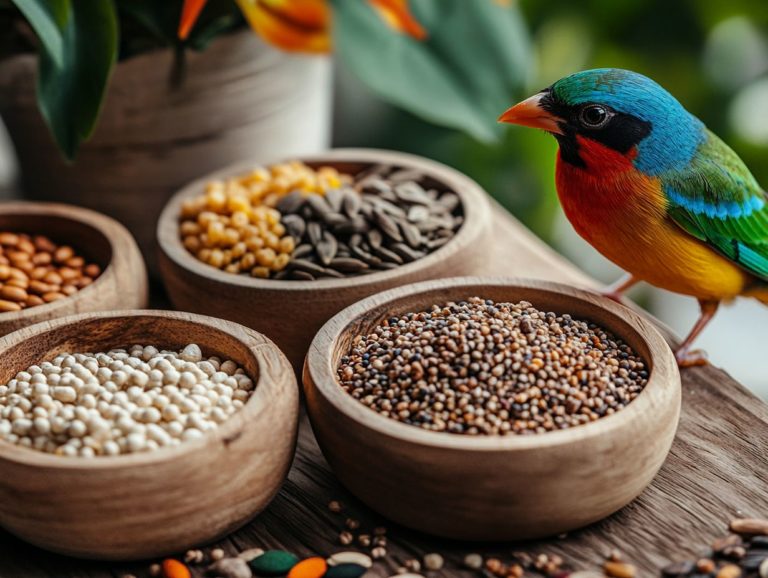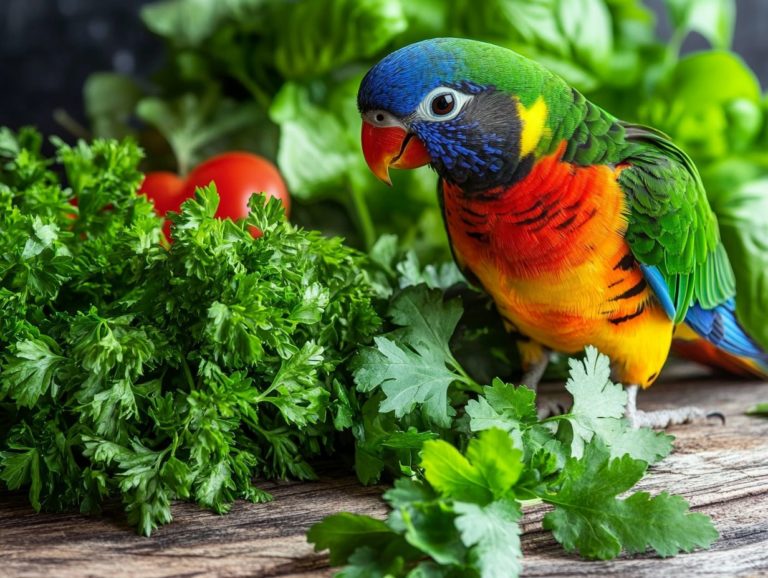The Best Bird Food Storage Practices
Proper bird food storage is essential for maintaining the health and happiness of your feathered companions. Just like you, birds depend on fresh, nutritious food to thrive. Inadequate storage can lead to spoilage and illness. Consider different levels of bird feeders to attract birds throughout the year.
This article explores the significance of selecting the right containers, understanding the specific storage requirements for various bird foods, and implementing best practices to preserve freshness. It also highlights common mistakes to help you provide your birds with the best diet possible. Using containers that keep rodents out is crucial!
Contents
Key Takeaways:
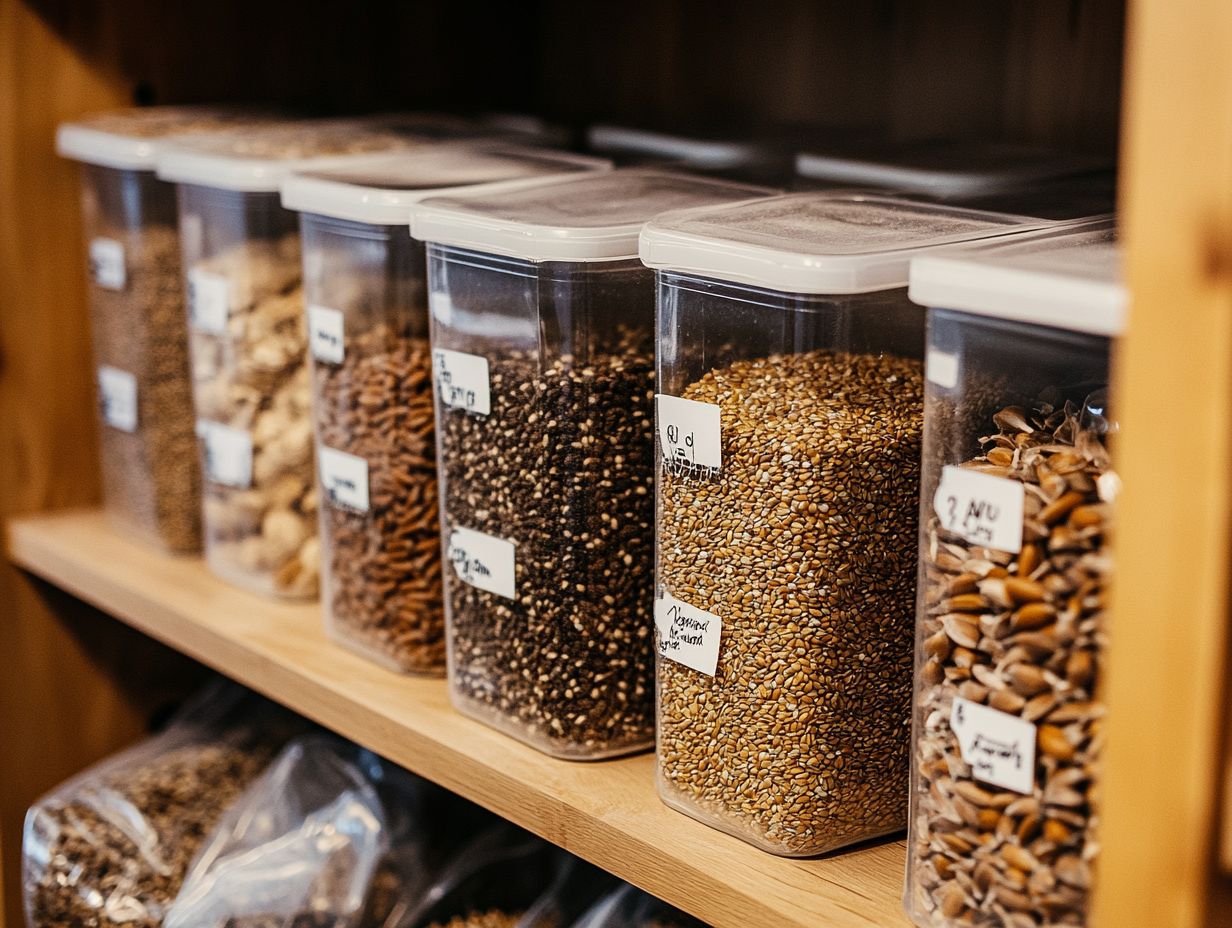
- Proper bird food storage is crucial for the health and well-being of your feathered friends.
- When choosing storage containers, consider the material and size to ensure freshness and safety, including both plastic and metal options.
- Cleaning and maintenance are essential for prolonging the shelf life of bird food. Avoid common mistakes to keep your bird food fresh and safe for consumption.
Why is Proper Bird Food Storage Important?
Proper bird food storage is vital for attracting a diverse array of birds to your garden. It guarantees that your bird feeders are filled with fresh bird seed and safeguards against contamination and spoilage.
Maintaining clean feeders is key for the health of visiting birds. This ensures they receive the right nourishment, such as sunflower seeds, black oil, and peanuts. Using containers that keep rodents out can effectively stop squirrels from munching on your stored bird seed, making your garden a secure haven for delightful visitors like woodpeckers, nuthatches, and titmice.
Why It Matters for Your Feathered Friends
The way you store bird food greatly influences the health and well-being of your feathered friends.
When you store fresh bird seed properly, you help maintain its nutrients, promoting vitality among various species. For example, sunflower seeds, suet, and peanut butter are great choices that elevate energy levels and support feather growth, especially during migration seasons. Using airtight containers, such as the popular Vittles Vault, prevents spoilage and extends the freshness of the food. This creates a more inviting atmosphere for the birds.
As a result, you may find a diverse range of birds flocking to your garden. This enhances your birdwatching experience and allows you to observe their vibrant colors and unique behaviors in their natural habitat.
Factors to Consider when Choosing Storage Containers
When searching for the perfect storage containers for your bird food, several key factors deserve your attention to ensure your seeds remain fresh and safe.
The choice between plastic and metal containers significantly impacts your success in keeping rodents and insects at bay. Consider the size of the container; it should fit your storage needs while being convenient to handle, especially for various types of seeds like nyjer seed and corn meal.
Understanding the durability of the material and its effectiveness in preserving seed freshness is vital for anyone passionate about avian care.
Take action to keep your bird food fresh and attract vibrant visitors to your garden! Share your birdwatching experiences and enjoy the beauty of nature.
Material, Size, and Other Considerations
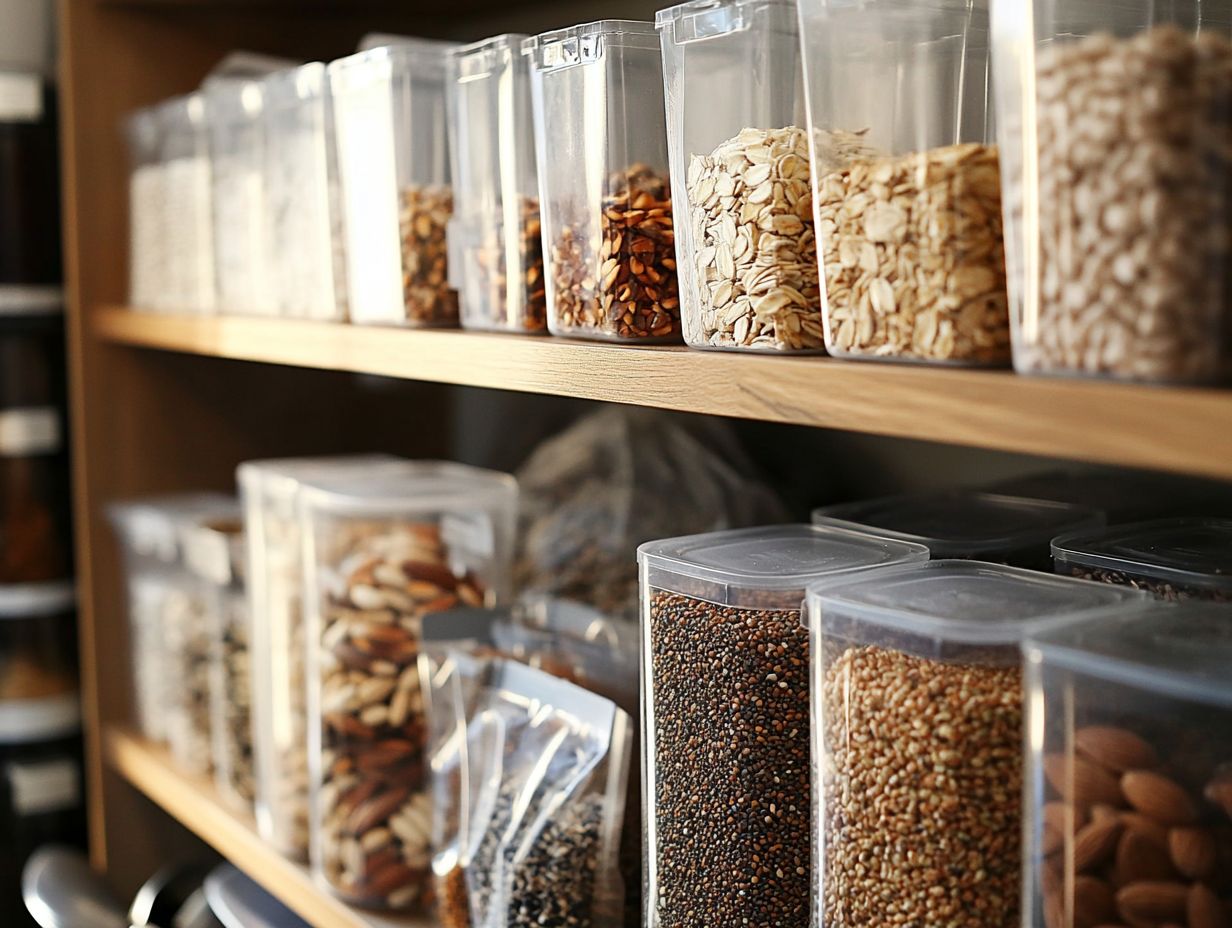
Choose the right material and size to keep your bird food fresh and secure! When selecting storage containers for bird food, both material and size are crucial for maintaining freshness and ensuring safety.
Choosing between plastic and metal containers greatly impacts durability and pest prevention. Metal containers are robust and protect against rodents, while plastic containers are lighter and often more cost-effective.
To keep seeds fresh, select a container that matches the type and quantity of seeds you have. An oversized container can lead to moisture buildup and spoilage, which is the last thing you want.
Look for features like seals that keep air out to preserve freshness. Consider transparent windows that let you easily monitor seed levels, ensuring you’re always ready to delight your feathered friends!
Types of Bird Food and Their Storage Needs
Different types of bird food have unique storage requirements that influence their freshness and accessibility for various bird species.
For instance, keep sunflower seeds, black oil seeds, and fruit for berry-eating birds in a cool, dry place to prevent spoilage. Suet and peanut butter should be stored in airtight containers to maintain their charm for birds like orioles, woodpeckers, and bluebirds.
Nyjer seed needs special attention to prevent clumping. Ground-feeding birds, such as robins, prefer seeds that are easily accessible. Proper storage ensures an inviting feast for all your feathered friends!
Seeds, Pellets, and More
Bird food comes in various forms, including seeds, pellets, suet, and raisins. Each requires specific storage methods to maintain effectiveness.
For example, seeds like sunflower and nyjer should be kept in airtight containers in a cool, dry place to preserve their freshness and nutritional value. These seeds spoil if they encounter moisture or heat.
Suet needs a cool environment ideally a refrigerator to prevent melting and spoilage. For pellets, keep the packaging sealed until you’re ready to use them, as exposure to air can make them go stale.
Follow these simple storage tips to keep your feathered friends coming back for more!
Best Practices for Storing Bird Food
Implementing best practices for storing bird food is key for maintaining freshness and ensuring the health of the birds visiting your feeders.
Regularly clean your bird feeders and promptly rake up spilled seeds to prevent mold, pests, and window collisions, which can discourage birds from stopping by.
Using rodent-proof containers will protect your bird food from squirrels and other critters. Always aim to provide fresh bird seed, as this is essential for attracting a diverse array of birds to your feeders.
Start organizing your bird food today to create a lively haven for your feathered friends!
Cleaning and Maintenance Tips
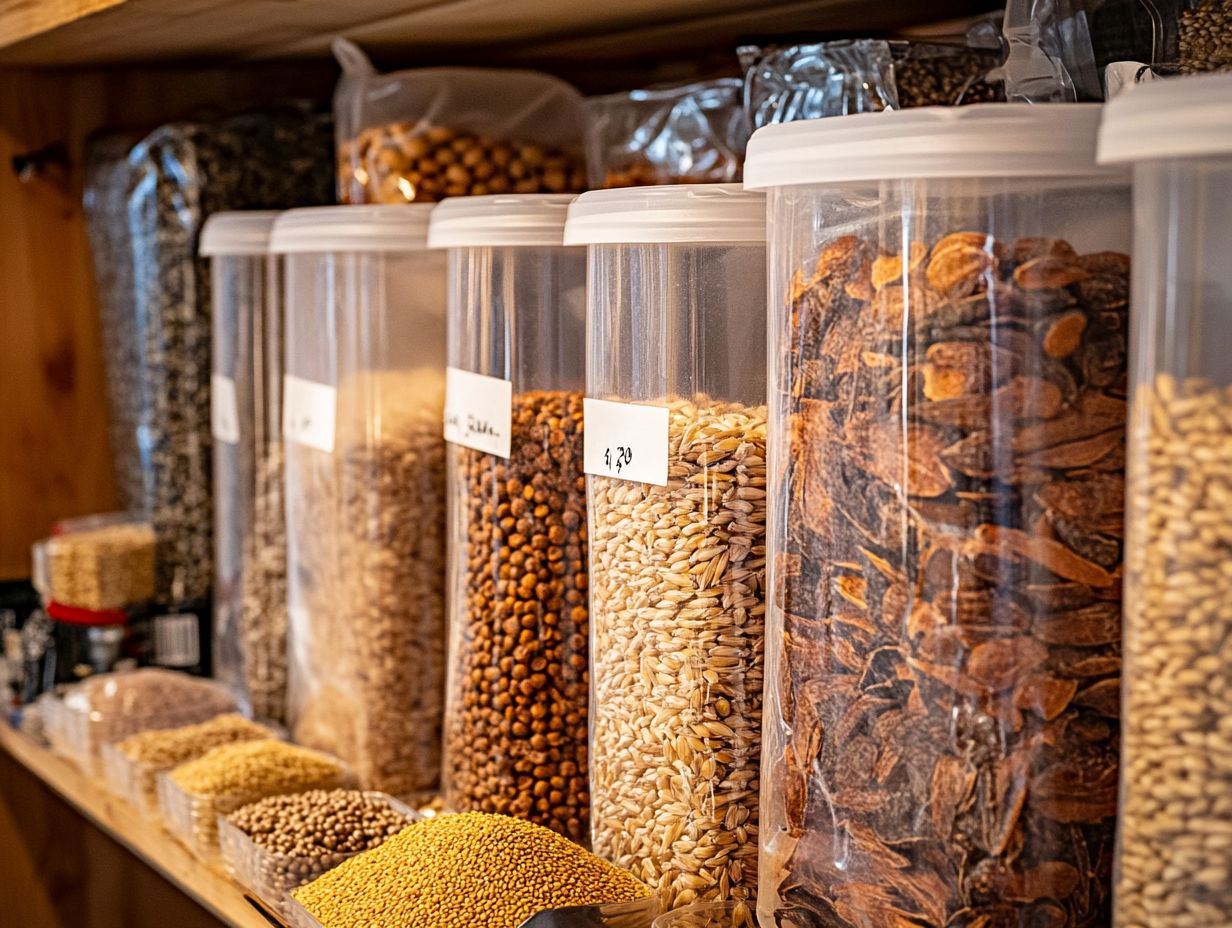
Cleaning and maintaining your bird feeders is essential for creating a safe and welcoming haven for your feathered companions. Regular upkeep not only keeps the feeders hygienic but also draws in a delightful variety of bird species.
To clean effectively, use warm, soapy water and a soft brush to reach every nook and cranny. Rinse thoroughly to eliminate any chemical residues.
Raking up spilled seeds beneath the feeders is a wise move; it prevents mold growth and keeps rodents at bay, fostering a healthier feeding environment.
By consistently replenishing fresh bird seed, you ensure that your avian visitors have a reliable food source, enhancing their well-being and encouraging them to return time and again. Start your cleaning today for happier birds!
Common Mistakes to Avoid
Avoiding common mistakes in bird seed storage can significantly enhance the effectiveness of your feeders and ensure the safety of your feathered visitors. Using fresh bird seed is crucial; neglecting this or storing food in anything less than rodent-proof containers can lead to spoilage and pest issues.
Not considering the risks of window collisions or leaving outdoor cats unattended can harm bird populations. Keeping cats indoors is wise to create a welcome environment for birds, allowing you to enjoy their presence fully.
How to Ensure Freshness and Safety
Ensuring the freshness and safety of bird food requires your care and a few essential practices that every bird enthusiast should embrace. Proper storage is paramount. Using airtight containers will safeguard your seeds from moisture and pests, preserving their food quality.
Routine inspection of your food supplies is wise. Discard any stale or spoiled portions to maintain a healthy feeding environment for your feathered friends.
Preventing rodent invasions is crucial. Placing bird feeders away from dense foliage helps deter these unwanted visitors. Minimize hazards like window collisions with visual markers stickers or decals that make glass visible to birds.
Keeping outdoor cats indoors protects the birds and fosters a safer ecosystem for everyone involved, allowing you to enjoy birdwatching without worry.
Frequently Asked Questions
What are the best bird seed storage practices?
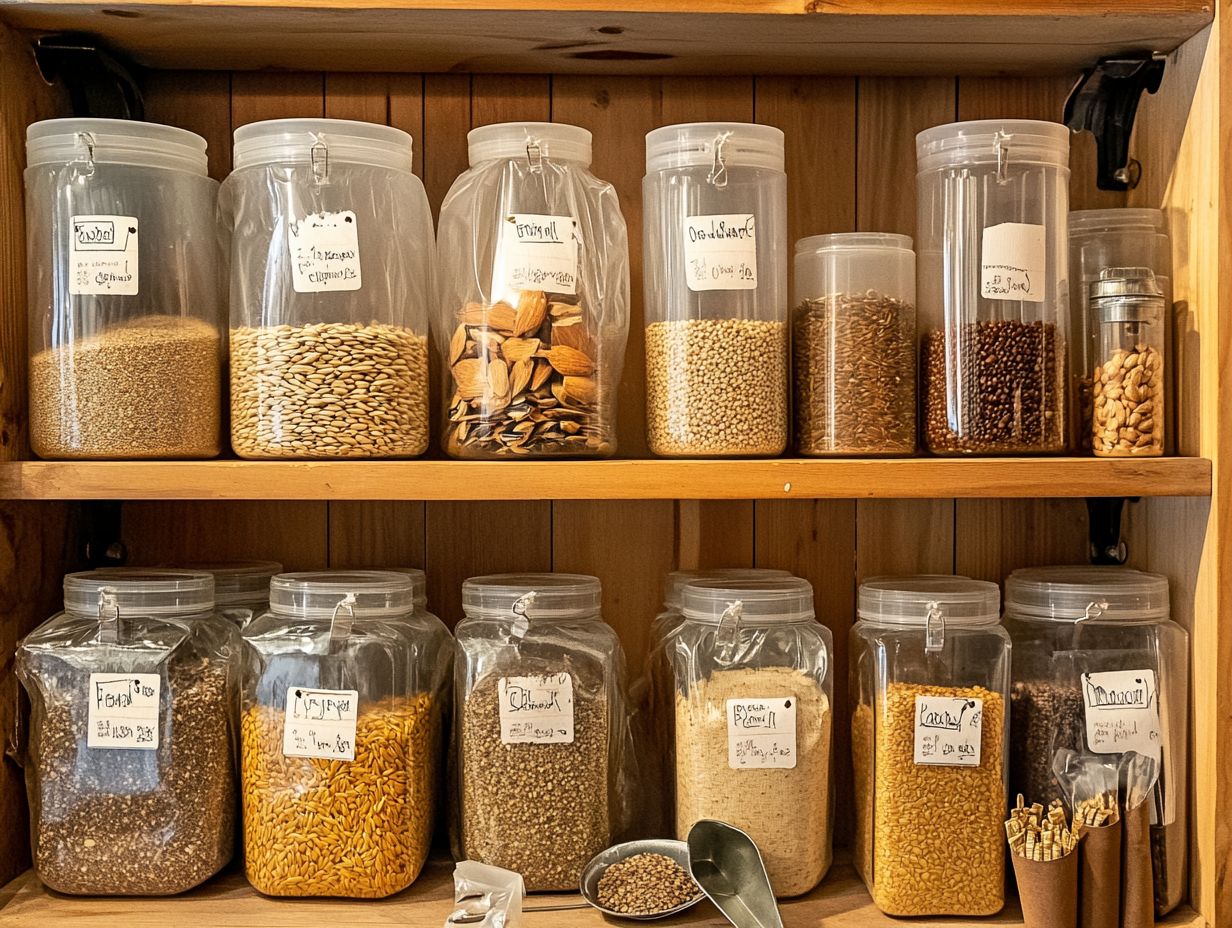
The best practices include keeping bird seed in sealed airtight containers, storing it in a cool, dry place, and following best practices for bird nutrition by using the oldest food first.
Why is it important to store bird food properly?
Storing bird food properly helps maintain its freshness and nutritional value, preventing mold and bacteria growth.
What type of container is best for storing bird food?
Airtight containers specifically designed for storing bird food, like plastic or metal containers, are the best options. Rodent-proof containers keep your bird seed safe from pests as well. Containers with tight-fitting lids also work well.
Should I store bird food in the refrigerator?
No, bird food should not be stored in the refrigerator as it can cause condensation and spoil the food. It is best to store it in a cool, dry place, like garbage cans or Vittles Vault containers that keep your bird food fresh.
How long can bird food be stored for?
The shelf life of bird food varies depending on the type, but generally, it can be stored for 6-12 months. Always check the expiration date on the packaging.
Can I mix different types of bird food in one container?
Yes, you can mix different types of bird food. Just ensure they have similar storage requirements and are not expired.
However, it’s best to keep them in separate containers. This prevents mixing and helps keep the food fresh. Bird feeding can be fun and varied! Mix different bird foods to attract a variety of feathered friends, but remember to store them wisely!

